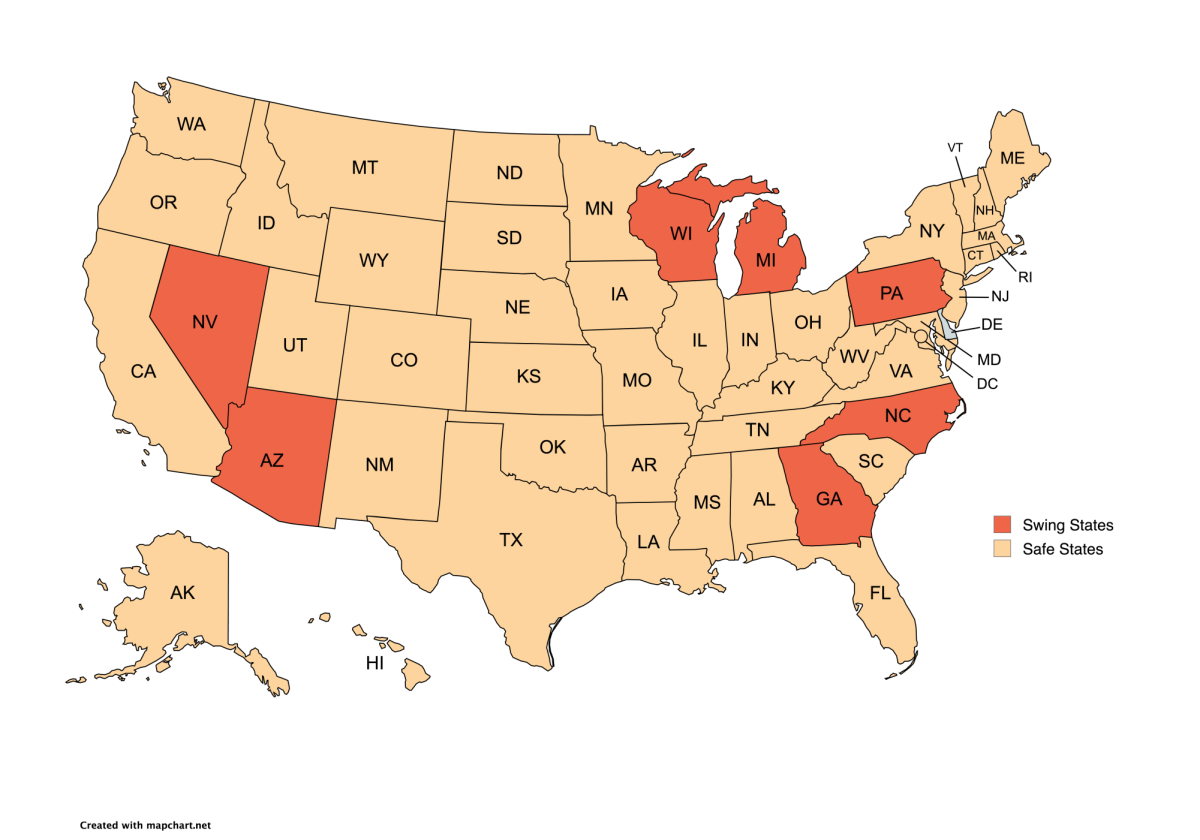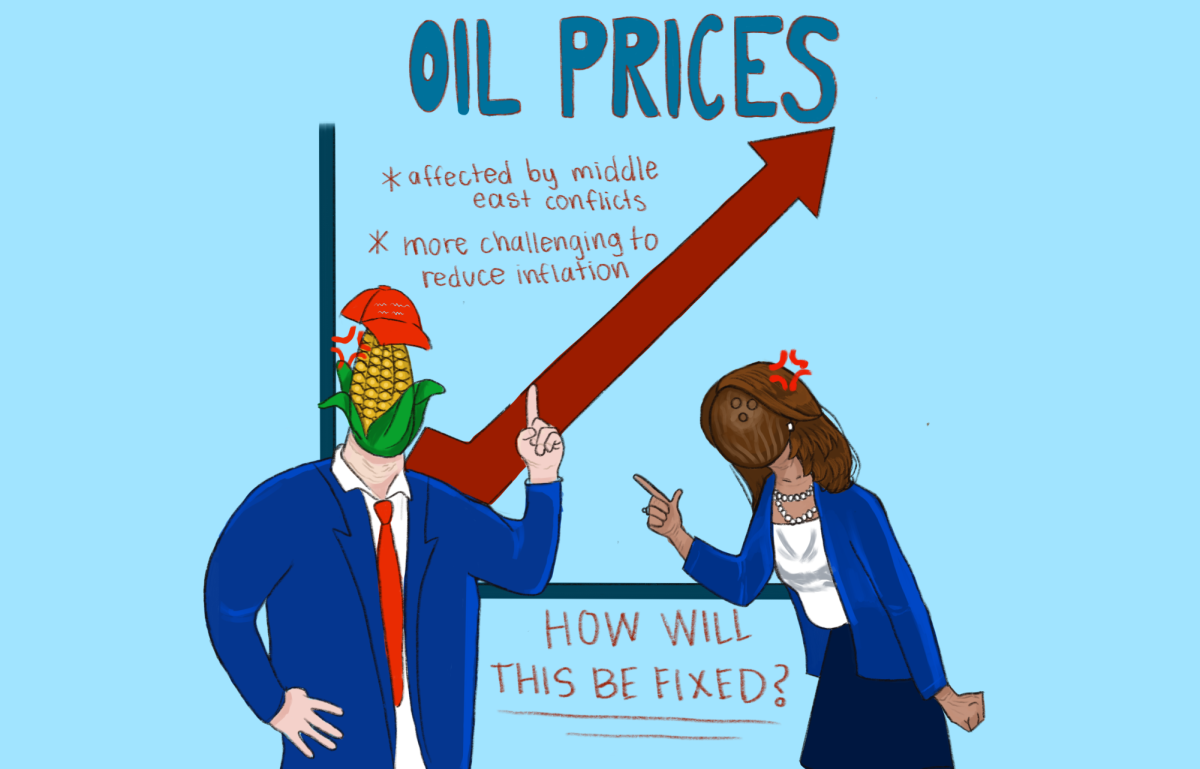Trump Policies
Former president Donald J. Trump aims to implement key policies from the Republican party platform that were decided at the Republican National Convention to “Make America Great Again.” Here are some of them.
Taxes and Economy
One of the core promises made at the RNC was to “end inflation and make America affordable again.”
Though a “president’s power to lower prices directly is very limited” according to a BBC News article about Trump’s policies, he plans to expand US energy production by increasing domestic oil drilling and preventing undocumented immigrants from getting mortgages to lower energy and housing costs, respectively.
According to taxfoundation.org, Trump’s tax policies are various ideas and proposals that could make or break the US economy.
Their effect on the country depends on which policies are used and how they are structured.
A few of Trump’s main tax and economic proposals include bringing back the SALT deduction (State and local taxes), imposing new steep tariffs, exempting certain types of income from income tax, reducing corporate tax for domestic production, and extending the expiring Tax Cuts and Jobs Acts changes.
According to taxfoundation.org Trump’s well-designed plan to spend on machinery, equipment, and research and development promotes economic growth on a long-term basis.
But the same article also indicates that his tax proposals could cause some problems as they would worsen the structure of the tax code and would not work in the long term due to problems like dispensation for tips and social security incomes.
Trump’s heavy dependency on tariffs to balance the cost of tax cuts also comes with a big drawback, as they aren’t ideal for raising revenues and could cause foreign retaliation. In the long term, tariffs are predicted to cause problems for the economy and will provide little to no benefits.
Health care
In his previous term in office, Trump made multiple attempts to repeal and replace the Affordable Care Act (ACA), also known as Obamacare, through various acts and executive orders with varying degrees of success, says ABC News in their article about Trump’s health care policies.
Though he wasn’t able to repeal the ACA as he originally planned, his administration passed several key changes to the act, including the removal of a tax penalty for being uninsured.
But Dr. Dennis Scanlon, a distinguished professor of health policy and administration at Penn State, told ABC News there’s been much less of a focus on repealing and replacing ACA from Trump than seen in 2016 and 2020.
In the presidential debate hosted by ABC News on Sept. 10, Trump maintained his opinion that “Obamacare was lousy health care,” stating that “it’s still too expensive for the people.”
“If we can come up with a plan that’s going to cost our people, our population, less money and be better health care than Obamacare, then I would absolutely do it,” stated Trump in the same debate. “But until then, I’ll run it as good as it can be run.”
He added, “I have concepts of a plan. I’m not president right now,” when asked about his specific health care plans by Linsey Davis, the ABC News moderator.
According to the Commonwealth Fund, Trump has been predicted to pursue policies reducing federal health care spending. He wants to expand many short-term plans.
While his reforms aim to give people choices regarding insurance plans, they have historically favored healthy people, giving them good insurance plans while raising premiums for sicker and older people.
Immigration
Immigration is one of Trump’s main issues with the country, making up the first two core promises of the Republican party platform.
According to the official Republican party platform, “Republicans will restore every Border Policy of the Trump administration.”
These policies include building a wall along the southern border of the US, restricting immigration (both legal and illegal), and reinstating agreements like the “Remain in Mexico” and “Safe Third Country” agreements, along with others.
According to the American Immigration Council, the “Remain in Mexico” program was a program introduced by Trump in January 2019 to force those seeking asylum to remain in Mexico while they wait for their trial, affecting 70,000 migrants. The Biden administration suspended the program after there were reports of human rights violations and logistical problems caused by the program.
The program was temporarily reinstated by the federal court from December 2021 to August 2022, sending 7,505 more people back to Mexico. It was eventually overturned by the Supreme Court and shut down indefinitely.
The American Immigration Council also states that the “Safe Third Country” agreement was a policy made by the Trump administration between the US, Honduras, Guatemala, and El Salvador, to restrict the amount of asylum seekers that can enter the US, and will deport them entirely.
Trump also plans to carry out “the largest domestic deportation operation in American history,” which would mandate US troops to relocate to parts of the Mexican border.
Trump’s proposal involves using both the military and the National Guard to capture and deport illegal immigrants.
He has announced one immigration increase policy to date: giving green cards automatically to vetted, noncitizen graduates of US colleges and universities.
Climate Change
According to Brookings.edu, Trump has openly stated that he has many plans for the environment and is in favor of completely changing the US’s climate policies.
He plans to heavily reduce energy costs and is aiming to remove the US from the Paris Agreement on climate change again, to help improve US industries’ competitiveness, along with removing regulations on oil and gas drilling.
The Paris Agreement is an international climate treaty that deals with climate change management and mitigation. Trump had removed the US from the Paris agreement in 2017, a decision that President Biden reversed when he was elected. If re-elected, Trump plans to remove the US from the agreement again, believing it’s a waste of our country’s resources and money, and stated that it was a “disaster.”
As part of the Republican party platform, Trump plans to “Unleash American Energy” so the nation can become energy independent. These plans include “lifting restrictions on American Energy Production and terminating the Socialist Green New Deal”. While meant to reduce inflation and costs to consumers, these policies can also have major environmental impacts.
Harris Policies
Vice President Kamala Harris is looking to implement key policies from the Democratic party platform if elected to office.
In early September Harris introduced a policy guide on the Harris-Walz administration website, listing various planned policies regarding economics, immigration, health care, and other key issues.
Here are the main takeaways from her policies:
Taxes and Economy
The Democratic nominee has emphasized the importance of supporting and building up the middle class throughout her presidential campaign.
According to BBC, Harris assisted President Joe Biden in passing major economic legislation, also known as “Bidenomics”, that invested in infrastructure and green energy.
Previously under the Biden administration, Biden and Harris supported the economy by creating job opportunities and combating rising inflation.
In June 2024, the Joint Economic Committee (JEC) reported “our economy has added more than 15 million jobs” with “40 consecutive months of job growth.”
The Consumer Price Index (CPI) in April 2024, a measure of inflation, showed a 3.4% increase in 2024, while in the CPI of June 2022, inflation reached a peak of 9.1%.
Harris has shown support for the Bipartisan Infrastructure Law, “an investment in our nation’s infrastructure, competitiveness, and communities” stated by the White House guidebook to Bipartisan Infrastructure Law.
The law was passed during Biden’s presidency with the help of Harris and provides funding to transportation, broadens access to drinking water and internet. The purpose of this law is to “grow the economy sustainably and equitably for decades to come.”
Additionally, Harris is continuing to support the Inflation Reduction Act after casting the tie breaking vote in Congress in Nov. 2021.
According to the White House, the Inflation Reduction Act has been the driving force of equitable recovery since the pandemic. This act plays an important role in mitigating climate change, reducing costs of healthcare and providing jobs for citizens.
In order to further strengthen the economy, Harris is aiming to restore two tax cuts: the Child Act Credit and the Earned Income Tax Credit in her upcoming presidency.
Essentially, the Earned Income Tax Credit will enable working middle-class citizens to retain more of their income, but will also ensure the upper class pays taxes proportionate to their income. The Child Act Credit includes a tax cut of $6,000 to families with newborns in order to prevent children from living in poverty.
Health care
As detailed on her campaign website, Harris is continuing to advocate for more affordable health care through the Affordable Care Act (ACA) or Obamacare, a health care act initiated by former President Barack Obama, and Medicare, a federal health insurance company that provides insurance for Americans of age 65 or older.
Later, she states that she will make “affordable health care a right, not a privilege.” If elected, Harris hopes to strengthen and expand the ACA to broaden access to healthcare.
According to healthcare.gov, the law subsidizes healthcare insurance for families with household incomes between 100% and 400% of the federal poverty level. For incomes at or below 150%, families also qualify for Marketplace coverage, a service that helps families shop and enroll in health insurance.
Previously, the Biden-Harris Administration successfully lowered Medicare premiums, including lowering the price of insulin to $35 and creating a cap of $2,000 for out-of-pocket prescription drugs as part of the Inflation Reduction Act.
Harris plans to negotiate with pharmaceutical companies to lower drug prices and to remove even more medical debt, after recently removing $7 billion of debt from 3 million Americans.
She also plans to make the Biden-Harris tax credit permanent, which lowers the cost of health insurance by around $800 annually for millions of Americans.
Immigration
After supporting border security bills and prosecuting criminal groups, Harris is looking to further combat immigration problems and support the US-Mexico border. Harris has acknowledged the weakness in our immigration system and hopes to reform it and remediate any faults that are in the system.
Harris plans to bring the Bipartisan Border Security bill back, which would add 1,500 border security agents and detect technology to impede drugs from entering our border.
The opioid and fentanyl crisis has devastated the lives of many Americans and the border security bill aims to lower the number of overdose deaths. With the border security bill, the number of overdose deaths will be lower.
During the presidency of Biden, there was a decrease in drug overdose deaths even without the Border Security bill.
According to cdc.gov, there has been a 3% decrease of estimated drug overdose deaths from 2022 to 2023. There were 111,029 deaths in 2022 compared to 107,543 deaths in 2023, the first annual decrease deaths since 2018.i
Climate Crisis
According to her campaign website, Harris has previously held big oil companies accountable and “cast the tie-breaking vote to pass the Inflation Reduction Act, the largest investment in climate action in history.”
According to the Environmental Defense Fund, the Biden-Harris administration’s contributions to mitigating the climate crisis have built on a clean energy economy.
The Inflation Reduction Act helped create 300,000 new clean energy jobs, brought more affordable solar and wind energy to the US and is helping reduce pollution.
As part of her campaign goals, Harris plans to continue tackling climate change while lowering energy costs by “creating hundreds of thousands of high-quality clean energy jobs, and building a thriving clean energy economy”
However, while she has made these promises, theweek.com indicates that the democratic party platform doesn’t mention specific climate change policies, and climate change wasn’t prominent in Harris’s acceptance speech at the Democratic National Conference. The website cites that polling shows “climate change is not a top issue for voters.







